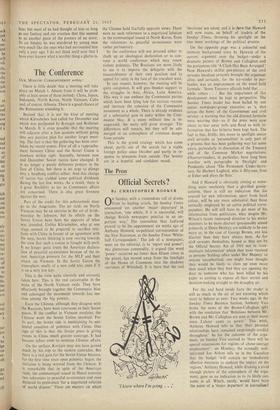The Conference
OUR MOSCOW CORRESPONDENT writes:
There is little doubt that a meeting will take place on March 1. Absent from it will be prob- ably at least seven of those invited: China, Japan, Indonesia, North Korea, North Vietnam, Cuba and, of course, Albania. There is a good chance of the Rumanians attending it.
Beyond that, it is not the kind of meeting which Khrushchev had called for December and which was postponed by Kosygin and Brehznev to March. It is even possible that the meeting will adjourn after a few sessions without going
into any positive plan for another larger meet-
ing. The fact is that the gathering has been over- taken by recent events. First of all a rapproche- ment between China and the Soviet Union is nowhere within sight. Secondly, between now and December Soviet tactics have changed. It is no longer a purely defensive posture in the face of China, but there is no urge to plunge into a headlong conflict either. And this change
of tactics has yielded some political dividends during the last few weeks. As a result, there is a great flexibility as far as Communist affairs are concerned. There is also great firmness against the west.
Part of the credit for this achievemetit must go to the Americans. The air raids on North Vietnam may be an exercise in the art of brink- manship by Johnson, but its effects on the Soviet Union have been the opposite of what was intended. Unlike Khrushchev, who at one stage seemed to be prepared to sacrifice rela- tions with China in favour of an agreement with the west, Soviet thinking is now veering towards the view that such a course is fraught with peril. It no longer quite trusts the American declara- tion of peaceful co-existence because of the re- cent American pressure for the MLF and their attack on Vietnam. In the Soviet Union the atmosphere smells of a new cold war, even if it is on a very low key.
This is the view quite sincerely and seriously taken here. This is the real catastrophe in the wake of the North Vietnam raids. They have effectively brought together the Communist bloc and sabotaged the movement towards less ten- sion among the big powers.
Even the Chinese, although they disagree with the Russians, have been courteous to their Soviet guests. If the conflict in Vietnam escalates, the Chinese want the Soviet Union involved. For its part, the Soviet side is maintaining its uni- lateral cessation of polemics with China. One sign of this is that the Soviet press is giving events in China much greater coverage. It had become taboo even to mention Chinese affairs. On the surface, Kosygin may not have gained Much by his trip to the eastern comrades. But there is a real gain for the Soviet Union because, for the first time since open polemics began, the initiative is being wrested from the Chinese. It is remarkable that in spite of the American
raids, the communiqud issued in Hanoi contains two references to peaceful co-existence and even
declared its preference 'for a negotiated solution of world dispute.' These are matters on which the Chinese hold fearfully opposite views. There were no such references to a negotiated 'solution in the communiqud issued in North Korea. Even the references to peaceful co-existence were rather perfunctory.
So the conference will not proceed either to chalk up an ideological declaration or to con- vene a world conference which may renew violent polemics. The Russians are more likely to use it to impress the delegates with the reasonableness of their own position and to appeal for unity in the face of the truculent west.
In one respect, however, the meeting will be quite outspoken. It will give- blanket support to the struggles in Asia, Africa, Latin America. This way it can enthuse the Communist parties which have been lying low for various reasons and increase the cohesion of the Communist movement as a whole. There is already evidence of a substantial gain in unity within the Com- munist bloc. If a more militant line is in- augurated, the unity will grow stronger. The differences wilt remain, but they will be sub- merged in an atmosphere of common danger from outside.
This is the grand strategy which has come about, partly out of the search for a viable foreign policy since October and partly in re- sponse to pressures from outside. The Soviets are in a hopeful and confident mood.


































 Previous page
Previous page